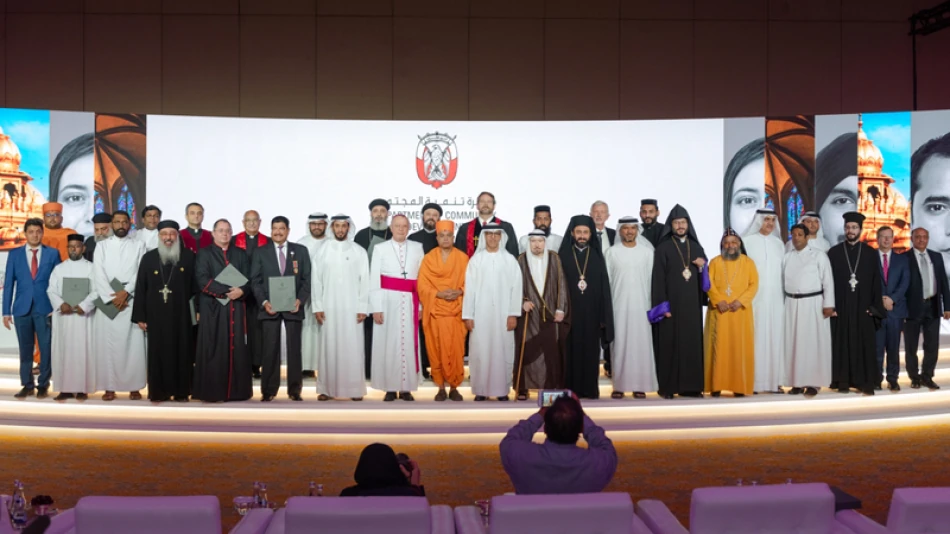
UAE Hosts Diverse Places of Worship: 73 Non-Muslim Sanctuaries Thrive in the Emirates
UAE's Religious Tolerance Takes Center Stage with 73 Non-Muslim Places of Worship
The United Arab Emirates has emerged as a global model for religious coexistence, hosting 73 licensed places of worship for non-Muslims across its seven emirates—a remarkable achievement for a Muslim-majority nation that houses over 200 nationalities. This infrastructure of tolerance reflects decades of deliberate policy-making that positions the UAE as a bridge between East and West, offering valuable lessons for other nations grappling with religious diversity in an increasingly polarized world.
A Strategic Distribution Across Emirates
According to the Ministry of Community Empowerment statistics, Abu Dhabi leads with 27 non-Muslim places of worship, followed by Dubai with 14, and Ras Al Khaimah with 11. Sharjah hosts 10 such facilities, Fujairah has 8, Umm Al Quwain maintains 2, and Ajman operates one. This distribution reflects both demographic realities and the UAE's federal approach to religious accommodation.
The numbers tell a story of organic growth rather than tokenism. Unlike some countries that establish single interfaith centers as symbolic gestures, the UAE has allowed religious communities to develop authentic worship spaces that serve genuine congregational needs.
Historical Foundations and Modern Framework
The UAE's commitment to religious tolerance isn't merely contemporary political positioning—it has historical roots. The Abu Dhabi Community Development Department points to St. Joseph's Church, established in the 1960s, as evidence of long-standing religious coexistence. Even more significantly, archaeological discoveries at Sir Bani Yas Island revealed the UAE's first discovered Christian site, demonstrating that religious diversity has ancient precedents in this region.
This historical continuity gained international recognition when the UAE hosted the signing of the Human Fraternity Document in 2019, bringing together prominent global religious leaders. The United Nations subsequently declared February 4th as International Day of Human Fraternity, cementing the UAE's role as a diplomatic leader in interfaith dialogue.
Legal Architecture for Religious Freedom
The UAE formalized its approach through Federal Law No. 9 of 2023, which regulates non-Muslim places of worship. This legislation provides clear guidelines for religious communities seeking to establish worship facilities, moving beyond informal tolerance to institutionalized religious rights.
The licensing requirements are substantial but achievable: founding groups must include at least 20 members over 40 years old, each having resided in the UAE for minimum five years. Applicants must demonstrate financial capacity to build and operate facilities, and receive endorsement from their religion's recognized authority.
Regional and Global Implications
The UAE's approach contrasts sharply with regional neighbors and offers lessons for Western nations. While Saudi Arabia has recently allowed some Christian worship for expatriates, it remains restrictive compared to the UAE's open framework. Qatar permits limited Christian services but lacks the UAE's systematic approach to religious infrastructure.
For Western democracies facing religious tensions—from France's debates over Islamic symbols to America's mosque controversies—the UAE demonstrates how majority-Muslim societies can successfully accommodate religious minorities without compromising national identity.
Economic and Diplomatic Dividends
This religious tolerance strategy delivers tangible benefits beyond moral leadership. The UAE's reputation for inclusivity attracts international businesses, expatriate professionals, and diplomatic missions. Companies establishing regional headquarters consider workforce diversity and employee satisfaction—factors directly influenced by religious accommodation policies.
The policy also enhances the UAE's soft power globally. As Western-Islamic relations face periodic strains, the UAE positions itself as a moderate voice capable of bridging divides. This reputation proves valuable in international negotiations, trade relationships, and cultural exchanges.
Challenges and Sustainability
Despite successes, questions remain about long-term sustainability. The UAE's tolerance model depends heavily on strong central authority and economic prosperity. Economic downturns or political transitions could test these policies' resilience.
Additionally, balancing religious accommodation with Islamic identity requires constant calibration. The government emphasizes that religious diversity operates "without compromising the authenticity of Emirati customs and traditions rooted in Islamic teachings"—a delicate balance that requires ongoing management.
The UAE's 73 non-Muslim places of worship represent more than religious infrastructure—they embody a strategic vision of national identity that embraces diversity as strength rather than challenge. As global societies wrestle with religious pluralism, the UAE's model offers practical insights into how tolerance can be systematically institutionalized while maintaining cultural authenticity.
Most Viewed News

 Sara Khaled
Sara Khaled






